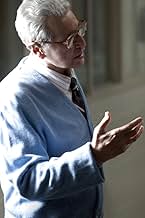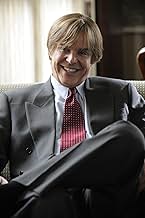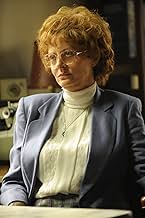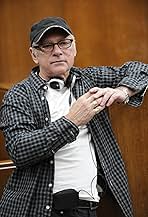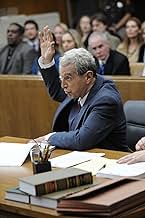IMDb-BEWERTUNG
7,5/10
31.382
IHRE BEWERTUNG
Al Pacino spielt die Hauptrolle des Dr. Jack Kevorkian, dem berühmt-berüchtigten "Doktor Tod“, der in den 1990er-Jahren zum Musterbeispiel für Sterbehilfe wurde.Al Pacino spielt die Hauptrolle des Dr. Jack Kevorkian, dem berühmt-berüchtigten "Doktor Tod“, der in den 1990er-Jahren zum Musterbeispiel für Sterbehilfe wurde.Al Pacino spielt die Hauptrolle des Dr. Jack Kevorkian, dem berühmt-berüchtigten "Doktor Tod“, der in den 1990er-Jahren zum Musterbeispiel für Sterbehilfe wurde.
- 2 Primetime Emmys gewonnen
- 11 Gewinne & 38 Nominierungen insgesamt
Empfohlene Bewertungen
Actors have been known to sit on their laurels. Some would argue that, with Oscar, Emmy, and Tony as best mates on the mantelpiece, Al Pacino can do just that. Do we respectfully think that all his truly great performances are in the past? Godfather, Michael Corleone? Or Scarface, Tony Montana? Happily we can think again. Seeing You Don't Know Jack, we know it's the film Pacino fans have waited for.
Opening scenes give us Dr 'Death' Kevorkian. Before he invents his famous assisted suicide machine. I look closely at this point. I have to reassure myself it is indeed Pacino, not a docu-drama cut-in. For Pacino looks more like Kevorkian than Kevorkian does. Face, body language, tone of voice, the works.
The first achievement is to captivate with the character himself. Not the divisive issues he represents. Bypass the hazards of predictable biopics. Or monotonous 'message' movies. This is quality mainstream film-making and at its best. It doesn't seek to change views, and the spiky Mr Kevorkian leaves plenty of room to disagree, isolating himself often from even his own supporters. This is a passionate man who has little time for other people's views in any general sense. "Who cares what other people think?" he exclaims. "It's what my patient feels." This is not the first time director Barry Levinson has astounded audiences. Slick approaches shaking up accepted thinking. Wag the Dog was to be a wildcard that would embarrass Clinton's government. The Oscar-winner, Rain Man, was criticised for creating a misleading stereotype (Is every autistic person a closet savant? Of course not.) But what Rain Man did do was raise awareness. Make it OK to talk openly about autism. And – perhaps this is the secret – You Don't Know Jack could have a similar effect just because it is just as funny, just as entertaining, just as engaging and just as challenging. We so get many different emotions in fast succession on the screen, until we're primed to consider , "How do I really feel about this?" Real people (including death scenes with Kevorkian's patients) are more gutsier coathooks for feelings than the vague ethical constructs debated in every high school.
If movies learn anything from TV, it's how to keep audience attention. And You Don't Know Jack is suitably punchy. It dismisses any thought of getting up for coffee. No boring arguments for or against euthanasia. None of those Clint Eastwood, long and meditative, 'Million Dollar Baby' moments. Susan Sarandon even brings some of her own caustic lines to a film that often brims over with dark, surreal humour. "Is that Santa Claus stepping on a baby?" she asks casually at an exhibition of Kevorkian's bizarre paintings.
There are powerful performance in abundance, not least from the underrated Danny Huston who plays Fieger, Kevorkian's larger-than-life attorney. (Immediately after the movie first aired, the real Geoffrey Fieger announced he will 'maybe stand again' for governor.) Fieger is a colourful, over-the-top character in real life, perfectly suited to Huston's strengths. After watching Danny Huston's talent wasted in lesser films, such as the well-intentioned Boogie Woogie, it is a joy to see him shine.
Bare-knuckle scenes in You Don't Know Jack are explicit. Both in the physical acts of assisted suicide and in their emotional intensity. Kevorkian recalls his own mother's death to Janet Good (Sarandon). "She told me, 'Imagine the worst toothache in the world – now imagine that toothache in every bone in your body." He is almost penniless (for he never charged) and, with scientific precision, he at one point tries to save on lethal gas. He places his emphysema patient in a plastic hood (to catch the gas, rather than using a face-mask). But the patient panics and it is nearly the last straw for friend and assistant Neal Nicol, played effortlessly by John Goodman. Such scenes are not for the squeamish.
The sense of sincerity and conviction which Pacino gives the role could make it rather uncomfortable viewing if you disagree outright. But this intense, yet sidelong glance at a deeply polarising topic, seriously tackled but deftly relieved with a sharp witty screenplay, might just give new life to a debate that suffers from political hubris set against rather static public opinion.
You Don't Know Jack reveals a person a long way from popular conceptions. Even if you read his autobiography and see him in interview, as I have, he was and still is, a hard person to fathom. An egocentric – or to use a word he suggested himself – a zealot – it often seems that Kevorkian believes in himself to the point of being inaccessible. "You're gonna need some business cards you know!" chides his sister. For this driven man who is happy to live on a pittance and then go on hunger strike, the importance of such details can, it seems, easily be missed.
At over two hours long, the movie occasionally verges on repetition. Levinson, back on form after several also-rans, maintains the pace with intelligent humour and inventive cinematography. "You understand what prison is?" Judge Jessica Copper asks Kevorkian, who seems oblivious of the potential consequences of his actions. "Did you see The Shawshank Redemption, Sir?" During the hunger strike, a fast montage of slamming doors and uneaten foodtrays makes an impression on our ears and eyes faster than any amount of words – and also provides a welcome change of tempo.
This is cinema of the unexpected. With subject matter that should have been unbankably inauspicious. Yet You Don't Know Jack triumphs to take your breath away. Even without a plastic hood.
Opening scenes give us Dr 'Death' Kevorkian. Before he invents his famous assisted suicide machine. I look closely at this point. I have to reassure myself it is indeed Pacino, not a docu-drama cut-in. For Pacino looks more like Kevorkian than Kevorkian does. Face, body language, tone of voice, the works.
The first achievement is to captivate with the character himself. Not the divisive issues he represents. Bypass the hazards of predictable biopics. Or monotonous 'message' movies. This is quality mainstream film-making and at its best. It doesn't seek to change views, and the spiky Mr Kevorkian leaves plenty of room to disagree, isolating himself often from even his own supporters. This is a passionate man who has little time for other people's views in any general sense. "Who cares what other people think?" he exclaims. "It's what my patient feels." This is not the first time director Barry Levinson has astounded audiences. Slick approaches shaking up accepted thinking. Wag the Dog was to be a wildcard that would embarrass Clinton's government. The Oscar-winner, Rain Man, was criticised for creating a misleading stereotype (Is every autistic person a closet savant? Of course not.) But what Rain Man did do was raise awareness. Make it OK to talk openly about autism. And – perhaps this is the secret – You Don't Know Jack could have a similar effect just because it is just as funny, just as entertaining, just as engaging and just as challenging. We so get many different emotions in fast succession on the screen, until we're primed to consider , "How do I really feel about this?" Real people (including death scenes with Kevorkian's patients) are more gutsier coathooks for feelings than the vague ethical constructs debated in every high school.
If movies learn anything from TV, it's how to keep audience attention. And You Don't Know Jack is suitably punchy. It dismisses any thought of getting up for coffee. No boring arguments for or against euthanasia. None of those Clint Eastwood, long and meditative, 'Million Dollar Baby' moments. Susan Sarandon even brings some of her own caustic lines to a film that often brims over with dark, surreal humour. "Is that Santa Claus stepping on a baby?" she asks casually at an exhibition of Kevorkian's bizarre paintings.
There are powerful performance in abundance, not least from the underrated Danny Huston who plays Fieger, Kevorkian's larger-than-life attorney. (Immediately after the movie first aired, the real Geoffrey Fieger announced he will 'maybe stand again' for governor.) Fieger is a colourful, over-the-top character in real life, perfectly suited to Huston's strengths. After watching Danny Huston's talent wasted in lesser films, such as the well-intentioned Boogie Woogie, it is a joy to see him shine.
Bare-knuckle scenes in You Don't Know Jack are explicit. Both in the physical acts of assisted suicide and in their emotional intensity. Kevorkian recalls his own mother's death to Janet Good (Sarandon). "She told me, 'Imagine the worst toothache in the world – now imagine that toothache in every bone in your body." He is almost penniless (for he never charged) and, with scientific precision, he at one point tries to save on lethal gas. He places his emphysema patient in a plastic hood (to catch the gas, rather than using a face-mask). But the patient panics and it is nearly the last straw for friend and assistant Neal Nicol, played effortlessly by John Goodman. Such scenes are not for the squeamish.
The sense of sincerity and conviction which Pacino gives the role could make it rather uncomfortable viewing if you disagree outright. But this intense, yet sidelong glance at a deeply polarising topic, seriously tackled but deftly relieved with a sharp witty screenplay, might just give new life to a debate that suffers from political hubris set against rather static public opinion.
You Don't Know Jack reveals a person a long way from popular conceptions. Even if you read his autobiography and see him in interview, as I have, he was and still is, a hard person to fathom. An egocentric – or to use a word he suggested himself – a zealot – it often seems that Kevorkian believes in himself to the point of being inaccessible. "You're gonna need some business cards you know!" chides his sister. For this driven man who is happy to live on a pittance and then go on hunger strike, the importance of such details can, it seems, easily be missed.
At over two hours long, the movie occasionally verges on repetition. Levinson, back on form after several also-rans, maintains the pace with intelligent humour and inventive cinematography. "You understand what prison is?" Judge Jessica Copper asks Kevorkian, who seems oblivious of the potential consequences of his actions. "Did you see The Shawshank Redemption, Sir?" During the hunger strike, a fast montage of slamming doors and uneaten foodtrays makes an impression on our ears and eyes faster than any amount of words – and also provides a welcome change of tempo.
This is cinema of the unexpected. With subject matter that should have been unbankably inauspicious. Yet You Don't Know Jack triumphs to take your breath away. Even without a plastic hood.
Love him or hate him, agree or disagree with his stance on assisted suicide, Jack Kevorkian makes for good television. Detroit's "Dr. Death" is a polarizing force in medical ethics, a man who believes that a person's right to self-determination includes the right to decide when enough is enough.
Al Pacino is a dead-wringer for Kevorkian (pun intended), the son of Armenian immigrants who escaped the Turkish genocide. He passionately lives the edict that one must disobey laws one feels are immoral. For Kevorkian, that means helping the terminally ill end their suffering and die with dignity, at a time of their choosing, regardless of its cost to him.
HBO's docudrama shows Kevorkian at his best and worst, compassionate with those who ask for his help, acerbic to the point of viciousness with anyone he considers stupid. Kevorkian is not necessarily a nice man, but he is obdurate when it comes to his principles. We see him argue with prosecutors, walk out on court proceedings, lock horns with his attorney Geoffrey Fieger. Nothing sways him in his zeal for allowing individuals suffering from end-stage terminal illness to decide for themselves what—and when--it means to die with dignity.
The talented supporting cast includes big names like Susan Sarandon, Brenda Vaccaro, John Goodman, and Danny Huston, as well as a slew of less-known actors who portray Kevorkian's patients/victims with heartbreaking realism. Make no mistake, however; this is Pacino's show from start to finish. His physical resemblance to the real Kevorkian is uncanny. He rants, he rages, he cajoles, he sympathizes. He assists and he initiates. It is sometimes difficult to remember that we are watching a supremely talented actor and not the man he is portraying.
"You Don't Know Jack" clearly sides with Kevorkian's viewpoint. It does so, however without sensationalism, nor does it dismiss nor trivialize the opposing side. In other words, "You Don't Know Jack" does what television does best: It entertains while challenging viewers to engage in dialogue about a topic that truly matters.
Al Pacino is a dead-wringer for Kevorkian (pun intended), the son of Armenian immigrants who escaped the Turkish genocide. He passionately lives the edict that one must disobey laws one feels are immoral. For Kevorkian, that means helping the terminally ill end their suffering and die with dignity, at a time of their choosing, regardless of its cost to him.
HBO's docudrama shows Kevorkian at his best and worst, compassionate with those who ask for his help, acerbic to the point of viciousness with anyone he considers stupid. Kevorkian is not necessarily a nice man, but he is obdurate when it comes to his principles. We see him argue with prosecutors, walk out on court proceedings, lock horns with his attorney Geoffrey Fieger. Nothing sways him in his zeal for allowing individuals suffering from end-stage terminal illness to decide for themselves what—and when--it means to die with dignity.
The talented supporting cast includes big names like Susan Sarandon, Brenda Vaccaro, John Goodman, and Danny Huston, as well as a slew of less-known actors who portray Kevorkian's patients/victims with heartbreaking realism. Make no mistake, however; this is Pacino's show from start to finish. His physical resemblance to the real Kevorkian is uncanny. He rants, he rages, he cajoles, he sympathizes. He assists and he initiates. It is sometimes difficult to remember that we are watching a supremely talented actor and not the man he is portraying.
"You Don't Know Jack" clearly sides with Kevorkian's viewpoint. It does so, however without sensationalism, nor does it dismiss nor trivialize the opposing side. In other words, "You Don't Know Jack" does what television does best: It entertains while challenging viewers to engage in dialogue about a topic that truly matters.
Throughout the history of Mankind, there are a plethora of unique individuals who stand as giants as they have changed the world. Columbus, Gailieo, Copernicus, Darwin and Einstein, have all fought a prevailing notion of a given era. To this famous list one can add the dedicated Dr. Jack Kavorkian. Born May 26, 1928 is an American pathologist, right-to-die activist and painter. His life is the center of this movie called " You don't know Jack. " Al Pacino, who bears an astonish resemblance, plays Dr. Jack Kevorkian and does an incredible job. Other notable thespians like Brenda Vaccaro, Susan Sarandon, John Goodman and Danny Huston all appear like towering pillars in a magnificent temple. Together their performance allows the audience to view the good doctor in his Herculeion task of establishing a man's right to die. Despite being ostracized, ridiculed, vilified, hounded and even imprisoned, Kavorkian continued and in the minds of millions of rational people, his struggle established the precedent for humans, not a puritanical government, to chose the time to die. Pacino's performance is exceptional and this movie will become a Classic for future audiences. Recommended to anyone willing to listen. ****
"You don't know jack" is one of the greatest movie of 2010. It Shows the life of Jack Kevorkian. If you remember the 90s than you should have a picture of Dr Jack Kevorkian in your mind. He was just as famous as any movie star. He was the daily subject of medical discussion, The Movie Shows what truly was the intention of Dr Jack Kevorkian and how he released countless people from their misery. Barry Levinson directed the movie amazingly, and as for the performance Every one performed excellent. But Al Pacino Truly stole the show, he proved why he is considered the greatest of all time by many. He lost over 20 pounds for this movie and developed a physique so different than what he originally posses. Its amazing that he was able to pull of such a physically demanding task at the age of 70. AL out did himself with each and every scene. John Goodman, Brenda Vaccaro, Danny Huston, Susan Sarandon, Cotter smith and Logan all did outstanding job in this Epic movie. You don't know jack has all the elements to keep a movie fan at the edge of their seats. If you haven't had the opportunity to see this amazing movie than i strongly suggest you see this movie and you will realize why its such a phenomenon.
I've seen "You Don't Know Jack" twice now and will certainly watch it several times more with friends coming to watch my DVR HD recording of this HBO TV movie. It's not easy to watch the harrowing scenes of terminal patients in great distress. But with an outstandingly intelligent script, first-class cinematography and stellar performances by all the actors it becomes compelling viewing. Like Marion Cotillard's portrayal of Edith Piaf in "La Vie en Rose", Pacino's incredible performance will leave us with the feeling that he has indeed become Dr Kevorkian for us. His powerful acting gains pace as the movie progresses until the final dramatic courtroom scenes end the remarkable story of a pioneer eccentric's human rights obsession. While overtly sympathetic to Kevorkian, all sides of the arguments for or against assisted suicide are fairly presented and leave one thinking about the subject for days. In addition to Pacino's tour de force role I think that Barry Levinson's inspired direction brings this movie to masterpiece status. I hope it will be released on DVD soon so that a much wider audience can see it.
Wusstest du schon
- WissenswertesBased on Neal Nicol's and Harry Wylie's novel, "Between the Dying and the Dead: Dr. Jack Kevorkian, the Assisted Suicide Machine and the Battle to Legalize Euthanasia." It was published by Vision in 2006.
- PatzerDr. Kevorkian's original death machine (using IV drugs) was called the Thanatron, not Mercitron. The Mercitron was the name of his carbon monoxide based death machine.
- Zitate
Lynn Mills: Have you no religion? Have you no God?
Jack Kevorkian: Oh, I do, lady, I have a religion, his name is Bach. Johann Sebastian Bach. And at least my God isn't an invented one.
- SoundtracksEarly in the Morning
Written by Dallas Bartley, Leo Hickman & Louis Jordan
Performed by Harry Nilsson
Courtesy of RCA Records
By Arrangement with Sony Music Entertainment
Top-Auswahl
Melde dich zum Bewerten an und greife auf die Watchlist für personalisierte Empfehlungen zu.
Details
- Erscheinungsdatum
- Herkunftsland
- Offizieller Standort
- Sprache
- Auch bekannt als
- You Don't Know Jack
- Drehorte
- Produktionsfirmen
- Weitere beteiligte Unternehmen bei IMDbPro anzeigen
Box Office
- Budget
- 18.000.000 $ (geschätzt)
- Laufzeit
- 2 Std. 14 Min.(134 min)
- Farbe
- Sound-Mix
- Seitenverhältnis
- 1.78 : 1
- 1.85 : 1
Zu dieser Seite beitragen
Bearbeitung vorschlagen oder fehlenden Inhalt hinzufügen


